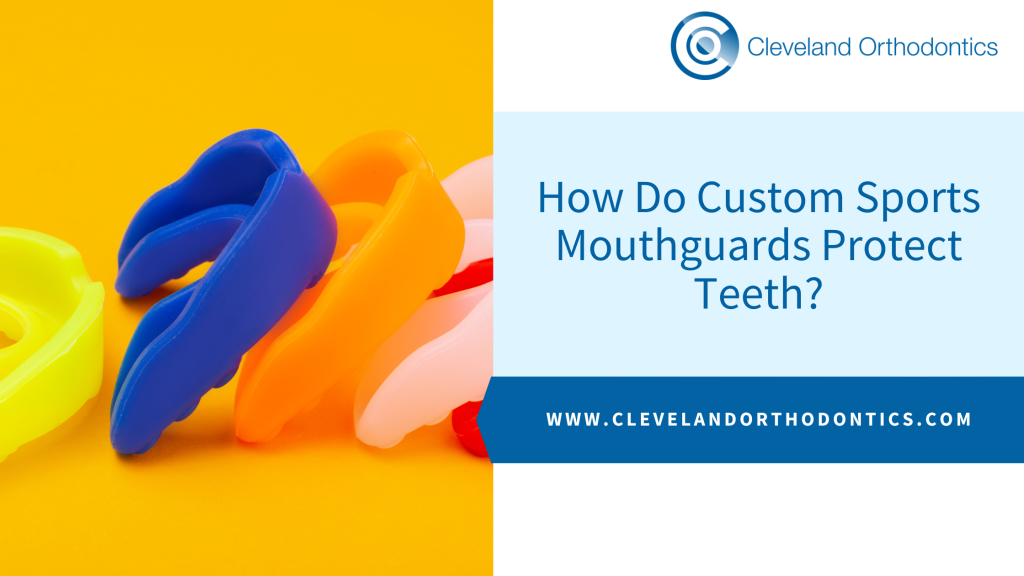
If your kids are involved in contact sports like football, rugby, or wrestling, naturally you might be concerned about their well-being as parents. But, more importantly, you would also want to ensure they don’t damage their pearly whites during the game due to a sports-related injury. But how can one ensure that their child’s teeth remain safe during contact sports? You may ask! It’s simple; you should get sports mouthguards for them to prevent their teeth from accidental damage during sports.Â
But what are mouth guards, and how do they protect the teeth and the oral cavity during sports? The answer to all these questions is given in this blog. So, continue reading to find out everything you need to know about mouthguards.
How Does A Mouthguard Protect Your Teeth?
According to the Oral Health Foundation, a mouthguard is a rubber-based appliance worn over the teeth to prevent damage to them during teeth grinding or contact sports. A mouthguard separates the upper and lower teeth and forms a cushion that prevents their damage in the case of a collision or trauma during contact sports.Â
Why Use A Mouthguard When Playing Sports?
We often see kids breaking their teeth or injuring their gums when they fall from a bicycle or collide with one another while playing football. When this happens, parents must take them to the dentist or the ER for treatment, sometimes involving expensive and time-consuming surgery. But all this can be avoided if your kids wear a mouthguard. So, the mouthguard bears the pressure instead of the teeth, thereby saving them from accidental fracture or falling off. So, all parents should get mouthguards for their kids involved in contact sports.Â
Do Upper Mouthguards Protect Your Bottom Teeth?
Mouthguards are typically designed to protect the upper teeth, as they protrude out more than the lower ones and are at a higher risk of damage during a collision or trauma. However, this does not mean the lower teeth remain unprotected with mouthguards. Instead, the mouthguards can prevent damage to upper and lower teeth when they forcefully mate during a collision or a fall. So, mouthguards have a protective effect on both the upper and lower teeth.Â
Do Mouthguards Go On Top Or Bottom?
Mouthguards are typically designed to be worn over the upper teeth. The reason is that the upper teeth are slightly more protruded than the lower ones and hence, are at a higher risk of getting damaged during sports. Furthermore, while mouthguards provide a cushioning effect over the upper teeth, they also separate the upper and lower ones. As a result, they prevent accidental damage to the lower teeth in the case of a vertical colliding force – such as during a fall – that results in the mating of both the upper and lower teeth with a very heavy force.
Should Mouthguards Cover All Your Teeth?
Typically, mouthguards are designed to be worn over the upper teeth as they are more at risk of damage during contact sports than the lower ones. However, the lower teeth generally remain safe during sports-related injuries as they lie behind and lower than the upper teeth. So, wearing a mouthguard on the upper teeth is enough to prevent all the teeth in the oral cavity from being damaged.Â
Why Should I Wear A Mouthguard?
A mouthguard is needed in various situations. For example, a night-time mouthguard, or a nightguard is recommended for patients who grind their teeth during sleep. Similarly, kids or adults involved in contact sports, such as football, rugby, or basketball, are also advised to wear mouthguards to protect their teeth during any sports-related injury. If you watch wrestling, you might have seen the players wear mouthguards just before the game begins; these are for protecting their teeth.Â
Can We Remould A Mouthguard?
Mouthguards are removable; you can simply remove them at your will. In fact, mouthguards are not required to be worn throughout the day. You only need to wear them when playing contact sports where there is a collision or fall risk. Similarly, if your dentist has given you mouthguards for bruxism, they must be worn while sleeping.Â
Can You Get A Mouthguard With Braces?
It may seem difficult to wear mouthguards over braces. However, the fact is that mouthguards can be worn over braces, but your dentist will have to make adjustments so that the braces do not interfere while you’re putting them on or off. Your dentist will make an impression of your teeth and the braces and send them to the laboratory, where the technician will make room on the inner side of the mouthguards so that you can easily wear or remove your mouthguards without dislodging your brackets.Â
As parents, we look after every aspect of our children’s health and well-being. Likewise, if our kids are enthusiastic about contact sports, we must protect their teeth and innocent smiles by getting mouthguards for them. A mouthguard may seem like a simple appliance, but it can do wonders in keeping your child’s teeth and gums safe from injury. If you are looking for a good kid dentist in your area, contact us today at Cleveland orthodontics! We prepare custom-made mouthguards for kids so they can play without worrying about their teeth and innocent smiles. So, please book an appointment with us today at Cleveland Orthodontics and let us take good care of your child’s oral health and physical well-being



